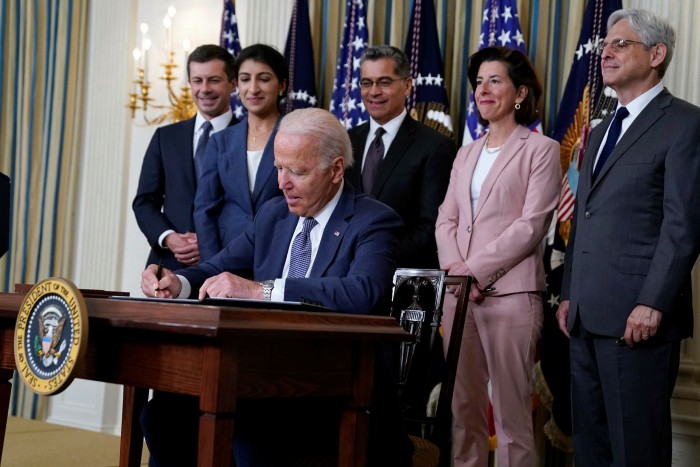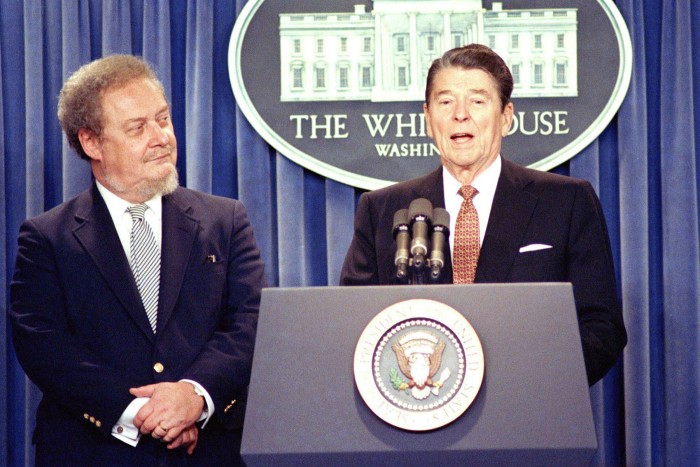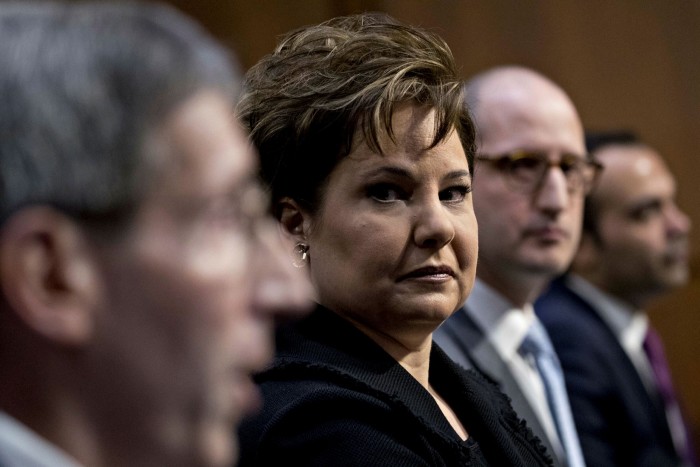In 1914, US President Woodrow Wilson enacted what was meant to be the final flourish of the early antitrust movement.
In the previous decade, the US government had broken up some of the most powerful monopolies in history, including Standard Oil, American Tobacco and the Northern Securities Company. Now Wilson wanted to make sure such monopolies were never allowed to exist again. So he set up the Federal Trade Commission, an almost uniquely powerful Washington regulator tasked both with writing new competition rules and enforcing them.
More than 100 years later, many progressives think the FTC has failed in its core mission. They point to the existence of giant US technology companies such as Google, Facebook and Amazon and argue that monopolies have once more been allowed to take over the US economy.
The antitrust movement’s figurehead is Elizabeth Warren, the US senator and one-time presidential candidate. But perhaps its most influential member is now Lina Khan, a 32-year-old academic whom Joe Biden has appointed to revolutionise the FTC and return it to its trustbusting origins.
In the past two months, Khan has begun a fundamental revamp of the commission, rescinding policies designed to limit its legal powers, changing the way it makes decisions and promising to rewrite the statements which underpin antitrust enforcement in the US. Supporters say she is putting in the foundations for a second trustbusting age.

Tim Wu, a White House adviser and another leading light of the new antitrust movement, says: “Under Wilson’s vision, [the FTC] was supposed to set the rules of the road for competition — the basic rules of what is fair and foul for competition — in quite some detail. That is consistent with what we are encouraging it to do.”
In seeking to return the FTC to what they see as its intellectual roots, Khan, Wu and their allies are challenging decades of bipartisan consensus on competition policy, which holds that companies should be allowed to become as large and powerful as they want as long as consumers are not harmed. Their plans are part of a broader shift which Biden hopes to achieve in US economic policy, challenging received wisdom on everything from taxation to deficits to inflation.
Khan’s allies say it is significant that her first major actions were to undo policies put in place by the two previous Democratic administrations, which were designed to give business more certainty about when the FTC might act but which they believe have tied regulators’ hands.
“The first two policies we overturned were put in place by the Clinton and the Obama administrations,” says one senior Democrat working at the commission. “It should be clear to everyone that we are going in a very different direction.”

But while progressives such as Khan and Wu are relishing the opportunity to remake an agency which they argue has long failed in its core missions of protecting consumers and encouraging competition, long-term FTC officials are worried about what the changes mean for their institution. They fear a repeat of the 1970s, when an activist FTC issued a flurry of new competition rules, only to be reined back in by Congress and even temporarily closed after it proposed banning all advertising to children under eight.
“Every piece of our jurisdiction is under threat,” says Christine Wilson, a Republican commissioner. “If we engage in the same type of over-reach we did in the 1970s, knowing that we have more detractors now than we did then, can you imagine the risk?”
She adds: “Given all of the detractors that have come out of the woodwork in recent years, augmented by all the changes Chair Khan is imposing, I am not sure that the agency will be around in five years, and that makes me very sad.”
Consumers first
The FTC is an almost unique regulator in Washington.
Congress deliberately kept the commission’s remit broad, so it would be able to respond to anti-competitive practices across different industries. The agency was to do everything from reviewing mergers, to investigating anti-competitive behaviour, to writing consumer protection rules. The idea, said those who drafted the law that set it up, was not to break up monopolies, but stop them forming in the first place.
“Other agencies typically have a detailed statute from Congress to take as their blueprint,” says Maureen Ohlhausen, a former commissioner. “The FTC has little more than one sentence.”
The FTC took on everyone from electricity utilities to Chicago milk sellers. It produced a report on international oil cartels so explosive that Harry Truman, the president at the time, initially ordered it should be kept secret. It even successfully challenged what it said were anti-competitive practices by the American Medical Association.
But that changed in the late 1970s, after Robert Bork, a conservative legal scholar and later judge, wrote his influential text The Antitrust Paradox, which argued that government enforcement of antitrust rules often made things worse for consumers by preventing the most efficient companies from rising to the top.
Bork’s insistence that consumers should be placed at the centre of competition policy even to the detriment of employees or smaller companies has informed antitrust enforcement since the Reagan administration.
Now a new generation of progressive academics say both the FTC and the Department of Justice have let vast swaths of the American economy become dominated by just a few companies.

Possibly the most well known of these young progressives is Khan, who made her name by writing an academic paper while in her late 20s at Yale Law School arguing for Amazon to be broken up.
Since taking over at the FTC, Khan has quickly begun to remodel it. Some of these changes look like technical internal reforms, while others are major policy statements. Almost all have been fiercely opposed by Republicans and the business community.
In the past few weeks, Khan has begun holding commission meetings in public — something Democrats say makes the commission more open to scrutiny, but which the two Republican commissioners say makes it harder for them to negotiate compromises.
She has banned staff from making public appearances such as conference panel sessions, saying the commission has too much work to do. She has passed a rule which allows FTC staff greater leeway to pursue investigations in certain priority areas, giving them the power to issue their own subpoenas for documents and testimony.
Khan is also promising to help rewrite the US merger guidelines, a complex set of documents laying out what kinds of evidence regulators look for when deciding whether a merger is illegal.
And, in a pair of crucial decisions, she and her fellow Democratic commissioners voted to rescind two key FTC policy statements.
The first was written in 1995 during Bill Clinton’s first term as president, and deemed that companies that had previously proposed unlawful mergers no longer had to notify the FTC before completing future transactions in the same market. By undoing that policy, Khan said she hoped to stop companies simply trying again and again to complete a merger even after it had been rejected by regulators.
The second statement was written in 2015 during the Obama administration and set down limits on when the FTC would prosecute a company for so-called “unfair methods of competition”.
“These changes are going to make dealmakers think about things differently,” says one senior Democrat working for the commission. “They are not filing an application, we are investigating as to whether there is a violation of the law. That is a fundamentally different way of thinking about things.”

Meanwhile, the White House has given the FTC the even bigger task of helping rewrite the rules that underpin the American economy. Under the terms of a sweeping order signed by Biden last month, the commission has been asked to devise rules which would ban companies from stopping employees moving to rivals, and prevent pharmaceutical companies from paying generic rivals from entering a certain market for a period of time.
The moves have delighted progressives, who say Khan’s willingness to push through reform quickly shows she is serious about putting the commission back at the heart of Washington rulemaking and enforcement.
“The commission has been lazy,” says Matt Stoller, director of research at the American Economic Liberties Project and a former colleague of Khan at the Open Markets Institute. “It has been a place where you send political cronies who don’t have to do any work if they don’t want to.
“This is such a different form of politics from the normal bullshit.”
Republican concerns
But if the reforms have pleased Khan’s supporters, they have worried conservatives who say the commission lacks both the legal authority and the institutional capacity to do what is being asked of it.
For example, Khan says she wants to renew the commission’s appetite for bringing cases against companies for “unfair methods of competition” — a vague category of corporate behaviour which allows the FTC to act even when there is no merger in question or when a company is not large enough to be a monopoly. She and fellow progressives argue that by not pursuing such cases the FTC has taken away one of its most powerful weapons.
Such behaviour is often very hard to prove, however. When the FTC charged Abbott Labs in 1994 with trying to rig a bid to supply the Puerto Rico government with infant formula, for example, it alleged the company’s choice not to bid in one of the rounds provided evidence of collusion with rivals. Abbott Labs’ lawyers, however, successfully used game theory to explain why a “no bid” could in fact have made rational economic sense.
More controversial is the idea that the commission is going to start writing wide-ranging new rules of its own, as envisioned in Biden’s competition order. This would test the limits of the FTC’s powers in both court and on Capitol Hill, critics say, and could end in Congress clipping its wings as it did in 1980 when the FTC was forced to subject its rules to Congressional review.
Sean Heather, senior vice-president for antitrust at the US Chamber of Commerce, says: “The FTC is writing its own rules and acting as prosecutor, judge and jury. This is deeply concerning for a regulatory agency with broad powers.”
Christine Wilson says: “I believe competition rulemaking is institutional suicide.”
If Khan wanted an indication of how courts might view her approach, she got one within weeks of taking over the commission. In June, a federal judge dismissed the commission’s complaint against Facebook, its most high-profile in years.
Trade Secrets

The FT has revamped Trade Secrets, its must-read daily briefing on the changing face of international trade and globalisation.
Sign up here to understand which countries, companies and technologies are shaping the new global economy.
The commission had argued the social media company had engaged in anti-competitive conduct for years, including by buying up potential rivals such as WhatsApp and Instagram. In June, however, a federal judge ruled the commission had failed to prove that Facebook had monopoly power over its market.
Khan’s critics worry that if the commission loses a series of high-profile court cases it will fatally undermine its authority. “If you lose enough cases your credibility evaporates,” says William Kovacic, a former Republican chair of the commission. “You can lose it all — not right away, but you can lose it all.”
For Khan’s supporters, however, this criticism borders on the absurd. “Don’t you think the FTC is already seen as weak?” says one senior member of the commission.
Progressives argue the FTC has for years only enforced competition rules against large companies in a fraction of the cases it should have. “Do you think there are only 10 anti-competitive mergers a year?” the commission member said. “I’m not sure it can get any worse.”
Even if Khan does win some of the landmark cases she is likely to bring, some worry the FTC will not have the capacity to write new competition rules and rewrite merger guidelines at the same time.
“The FTC can put together legal teams that can match the best in the bar, punch for punch, in a major case,” says Kovacic. “But the number of those teams is a couple, it is not 10.”

For years the commission’s budget and staffing levels have been chipped away. It now has roughly 50 per cent of the staff it had in 1980 and is currently trying to review a record number of mergers. In the first nine months of this fiscal year, the FTC received 2,573 notifications ahead of a large merger — already 50 per cent more than were received in the whole of last year.
Last week, the commission published a statement warning that it would not be able to review all mergers within 30 days of a notification being made, as required by law. Instead, the FTC said, if it had not had time to review a merger before it took place, it would reserve the right to take action even after it had been completed. “This year, the FTC has been hit by a tidal wave of merger filings that is straining the agency’s capacity to rigorously investigate deals ahead of the statutory deadlines,” the commission said in a statement.
The commission is also facing an uphill battle to retain staff. Some people say they feel demoralised by the pace of change and irritated they have not yet met their new chair — something Khan’s allies say is an unfortunate result of the pandemic. “There are only so many times you can hear that your institution has failed for years before you start to doubt your place in it,” says one staff member.
But a bigger problem is that companies and private law firms are gearing up for a more aggressive FTC by trying to poach its talent. “I usually have to place a couple of FTC people in any given year,” says Lauren Drake, a partner at the Washington-based recruiting firm Macrae. “So far this year I have had 10.”
Ian Conner, who left as head of the FTC’s bureau of competition in March to join the law firm Latham & Watkins, says: “Private firms are paying quite a bit more than they were six months ago. A first-year associate can now earn over $200,000 in the private sector. At the FTC they would be on $60,000 to $70,000.”
Conner was the regulator who launched the FTC’s case against Facebook last year. Last week Carl Shapiro, the lead economics expert in that case, also resigned.
Facebook test
At some point in the next few weeks, the FTC will make a decision on whether to refile that case with a new explanation of Facebook’s monopoly power, which could yet result in the break-up of the social media company.
For many observers, this will be the first external test of Khan’s leadership: will she dare test the court by approving a decision to file again, and if so will she win?
Success would be seen as vindication for her theories of antitrust and her criticism of Big Tech. Defeat could demoralise the staff around her just as her project is taking shape.
For others, however, the proof of her leadership will not be so much in the cases she brings but the institution she leaves behind. “We want the FTC to be the policy leader here and abroad,” says one ally within the commission. “We do not want to be the arbiter of an obscure area of law that has decayed over time.”
For all the latest Business News Click Here
For the latest news and updates, follow us on Google News.
